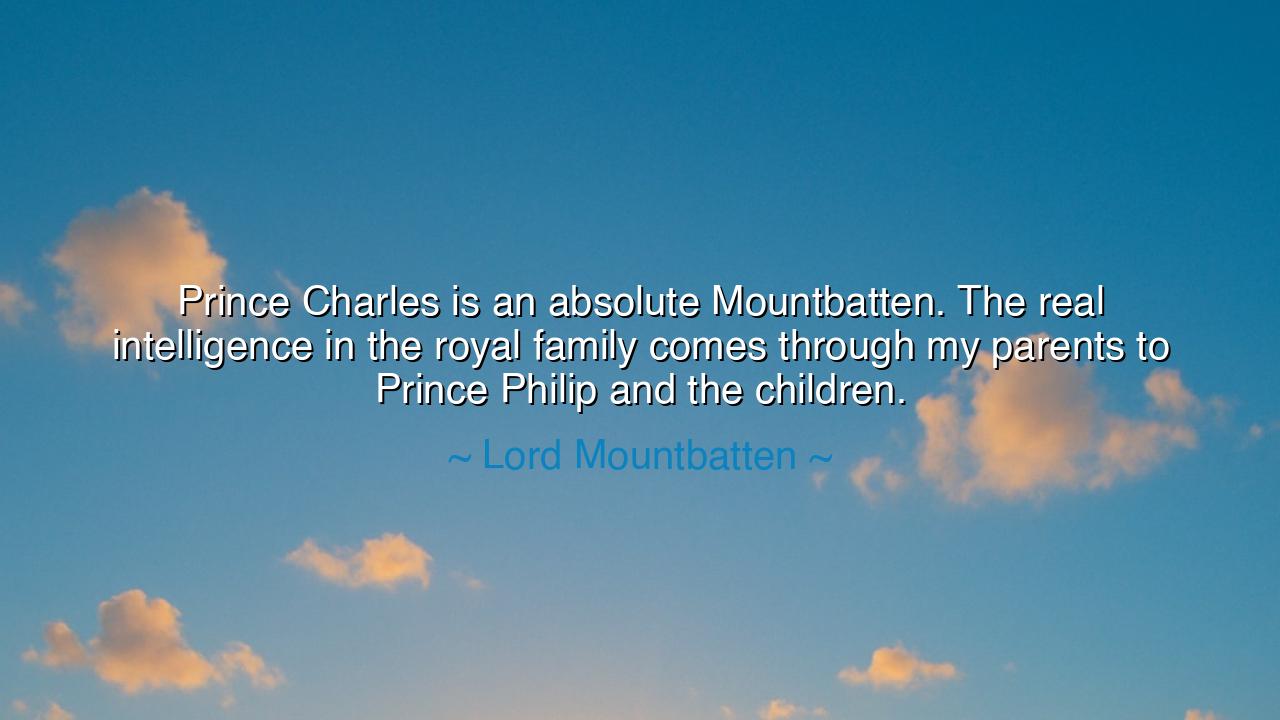
Prince Charles is an absolute Mountbatten. The real intelligence
Prince Charles is an absolute Mountbatten. The real intelligence in the royal family comes through my parents to Prince Philip and the children.






“Prince Charles is an absolute Mountbatten. The real intelligence in the royal family comes through my parents to Prince Philip and the children.” Thus spoke Lord Louis Mountbatten, the statesman, naval commander, and mentor to kings — a man whose life spanned empires and whose blood flowed through the very veins of Europe’s royal dynasties. In these words, Mountbatten does not boast of lineage but reveals a truth deeper than heritage: that intelligence, true and enduring, is not the possession of titles or crowns, but the inheritance of character, discipline, and purpose passed down through generations. His statement is both a reflection of pride and a meditation on legacy — the unseen power of family spirit that shapes the destiny of nations.
The origin of this quote rests in Mountbatten’s deep bond with his family, particularly his nephew, Prince Philip, Duke of Edinburgh, and his grand-nephew, Prince Charles. Mountbatten saw in them not only the continuation of royal blood, but the continuation of his family’s values: intellect, resilience, and service. The Mountbattens, originally of German descent, were known for their sharp minds and adaptability, surviving wars, exiles, and the transformations of the modern world. In the British royal house, Mountbatten recognized that same spark — a heritage of intelligence that, in his eyes, transcended ceremony. When he said that “the real intelligence in the royal family comes through my parents,” he was speaking not of cleverness alone, but of a moral and strategic intelligence — the ability to endure, to lead with insight, and to serve with vision.
Mountbatten himself embodied this inheritance. As Supreme Allied Commander in Southeast Asia during the Second World War, he led campaigns of immense complexity, balancing diplomacy and command. Later, as the last Viceroy of India, he guided one of the most delicate transitions in history — the birth of two nations, India and Pakistan. In these moments of peril and possibility, his intelligence shone not through brilliance of speech, but through calm leadership, restraint, and understanding of human nature. Thus, when he spoke of intelligence within his bloodline, it was not vanity — it was the recognition that the qualities which sustain power are not inherited through privilege, but through principle.
Prince Charles, whom Mountbatten called “an absolute Mountbatten,” bore that same mark of thoughtfulness and introspection. As a young man, Charles was often misunderstood by the public — reserved, contemplative, sometimes uncertain. Yet Mountbatten saw in him a mind capable of reflection, a heart attuned to duty, and a vision for the modern age. His mentor’s influence shaped Charles’s lifelong commitment to education, environmental stewardship, and the preservation of tradition within change. In time, the world came to see what Mountbatten foresaw: that intelligence, when tempered by empathy, is the foundation of wise leadership.
This truth is not confined to royal bloodlines. Across the ages, families and nations alike have risen or fallen by the inheritance of wisdom over wealth. Consider the Medici of Florence, patrons of art and intellect, whose influence shaped the Renaissance. Their fortune might have built monuments, but it was their intelligence — their cultivation of ideas, their nurturing of visionaries — that built civilizations. In every lineage, in every people, there exists a Mountbatten principle: that the true inheritance of greatness is not jewels or crowns, but the habits of thought and spirit that enable creation, compassion, and progress.
And yet, there is humility in Mountbatten’s reflection. Intelligence, he implies, is not the privilege of birth, but the fruit of upbringing and example. The Mountbattens endured war, exile, and scandal — yet through it all, they preserved dignity and service. In this way, intelligence becomes not a matter of intellect alone, but of integrity — the wisdom to act rightly when the world trembles. The “real intelligence” of a family, therefore, is the light of its values, the wisdom that survives the fall of empires and the passage of time.
Let this, then, be the lesson drawn from Mountbatten’s words: Do not mistake inheritance for destiny, nor intellect for wisdom. The intelligence that endures is that which serves others, that which adapts and uplifts. Cultivate not pride in your lineage, but pride in your principles. Whether you are born in palaces or in humble homes, your true nobility lies in how you think, how you learn, and how you lead. Pass on not riches, but clarity; not comfort, but courage.
For as Lord Mountbatten reminds us, the real intelligence of any family or people is the wisdom it preserves and the light it gives to the future. Guard that flame. Strengthen it through learning, humility, and service. And when you pass it on — as he did, through his words and example — let it shine in those who follow, not as arrogance, but as the quiet, enduring strength of understanding.






AAdministratorAdministrator
Welcome, honored guests. Please leave a comment, we will respond soon